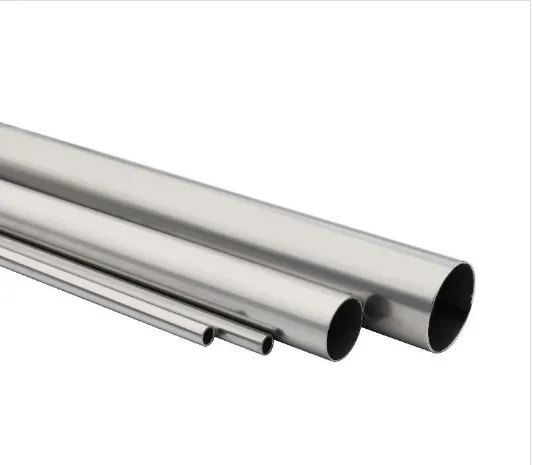Precision Steel Tubes vs. Titanium: Which is Better for Medical Devices?
Mar . 31, 2025 13:28
In the highly specialized and critical field of medical device manufacturing, choosing the right materials is of utmost importance. Two materials that often come under consideration are precision steel tubes and titanium. Precision steel tube manufacturers, like CBIES, play a significant role in providing high-quality products for this industry. Let's take a closer look at how these materials stack up against each other in the context of medical devices.

Precision Steel Tubes vs. Titanium: Strength and Durability
Precision steel tubes, especially those made of medical stainless steel tubing, offer remarkable strength. In applications such as medical bed frames, strength is crucial. A sturdy medical bed frame needs to support patients of various weights without any risk of collapse. CBIES' precision steel tubes, crafted with precision and high-grade materials, can withstand substantial loads. They are highly resistant to bending and deformation, ensuring long-term durability. Titanium, on the other hand, is also known for its strength. However, in some cases, precision steel tubes can offer a more cost-effective solution while still maintaining excellent strength characteristics.
Precision Steel Tubes vs. Titanium: Corrosion Resistance
Both precision steel tubes and titanium have good corrosion resistance, which is essential in a medical environment where exposure to moisture, cleaning agents, and body fluids is common. Medical stainless steel tubing from CBIES is designed to resist corrosion, protecting the integrity of medical equipment components. Titanium is highly corrosion-resistant as well. But when it comes to cost-effectiveness, precision steel tubes can be a more viable option. The corrosion-resistant properties of precision steel tubes are further enhanced through advanced manufacturing processes, ensuring that they can endure the harsh medical environment over extended periods.
Precision Steel Tubes vs. Titanium: Compatibility with Medical Applications
In medical equipment components, compatibility with the human body and other medical substances is crucial. Precision steel tubes, especially those made for medical use, are carefully engineered to meet strict biocompatibility standards. They do not react with body fluids or medications, making them safe for use in devices such as surgical instruments and implant-related components. Titanium is also biocompatible, but precision steel tubes offer a wider range of applications in terms of their versatility in manufacturing different types of medical devices. For example, in the construction of complex medical machinery, CBIES' precision steel tubes can be easily shaped and fabricated into various forms, providing more design flexibility.
Precision Steel Tubes vs. Titanium: Cost-Effectiveness
Cost is always a factor in medical device manufacturing. Precision steel tube manufacturers like CBIES offer products that are generally more cost-effective compared to titanium. The raw material cost of precision steel is lower, and the manufacturing processes for precision steel tubes can be more efficient. This cost-effectiveness does not compromise on quality. In large-scale medical device production, such as the manufacturing of multiple medical bed frames, the cost savings from using precision steel tubes can be significant. While titanium has its own advantages, precision steel tubes provide a reliable and budget-friendly alternative without sacrificing performance in many medical applications.
In conclusion, while both precision steel tubes and titanium have their merits in medical device manufacturing, precision steel tubes, especially those provided by leading precision steel tube manufacturers like CBIES, offer a combination of strength, durability, corrosion resistance, biocompatibility, and cost-effectiveness. For many medical applications, including medical bed frames and various medical equipment components, precision steel tubes prove to be an excellent choice. Medical device manufacturers should carefully consider their specific requirements and weigh the pros and cons of each material to make the best decision for their products.
 Afrikaans
Afrikaans  Albanian
Albanian  Amharic
Amharic  Arabic
Arabic  Armenian
Armenian  Azerbaijani
Azerbaijani  Basque
Basque  Belarusian
Belarusian  Bengali
Bengali  Bosnian
Bosnian  Bulgarian
Bulgarian  Catalan
Catalan  Cebuano
Cebuano  Corsican
Corsican  Croatian
Croatian  Czech
Czech  Danish
Danish  Dutch
Dutch  English
English  Esperanto
Esperanto  Estonian
Estonian  Finnish
Finnish  French
French  Frisian
Frisian  Galician
Galician  Georgian
Georgian  German
German  Greek
Greek  Gujarati
Gujarati  Haitian Creole
Haitian Creole  hausa
hausa  hawaiian
hawaiian  Hebrew
Hebrew  Hindi
Hindi  Miao
Miao  Hungarian
Hungarian  Icelandic
Icelandic  igbo
igbo  Indonesian
Indonesian  irish
irish  Italian
Italian  Japanese
Japanese  Javanese
Javanese  Kannada
Kannada  kazakh
kazakh  Khmer
Khmer  Rwandese
Rwandese  Korean
Korean  Kurdish
Kurdish  Kyrgyz
Kyrgyz  Lao
Lao  Latin
Latin  Latvian
Latvian  Lithuanian
Lithuanian  Luxembourgish
Luxembourgish  Macedonian
Macedonian  Malgashi
Malgashi  Malay
Malay  Malayalam
Malayalam  Maltese
Maltese  Maori
Maori  Marathi
Marathi  Mongolian
Mongolian  Myanmar
Myanmar  Nepali
Nepali  Norwegian
Norwegian  Norwegian
Norwegian  Occitan
Occitan  Pashto
Pashto  Persian
Persian  Polish
Polish  Portuguese
Portuguese  Punjabi
Punjabi  Romanian
Romanian  Samoan
Samoan  Scottish Gaelic
Scottish Gaelic  Serbian
Serbian  Sesotho
Sesotho  Shona
Shona  Sindhi
Sindhi  Sinhala
Sinhala  Slovak
Slovak  Slovenian
Slovenian  Somali
Somali  Spanish
Spanish  Sundanese
Sundanese  Swahili
Swahili  Swedish
Swedish  Tagalog
Tagalog  Tajik
Tajik  Tamil
Tamil  Tatar
Tatar  Telugu
Telugu  Thai
Thai  Turkish
Turkish  Turkmen
Turkmen  Ukrainian
Ukrainian  Urdu
Urdu  Uighur
Uighur  Uzbek
Uzbek  Vietnamese
Vietnamese  Welsh
Welsh  Bantu
Bantu  Yiddish
Yiddish  Yoruba
Yoruba  Zulu
Zulu 












